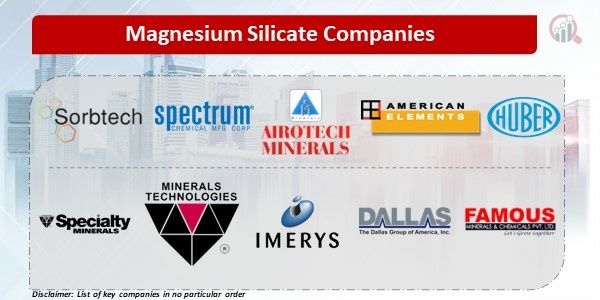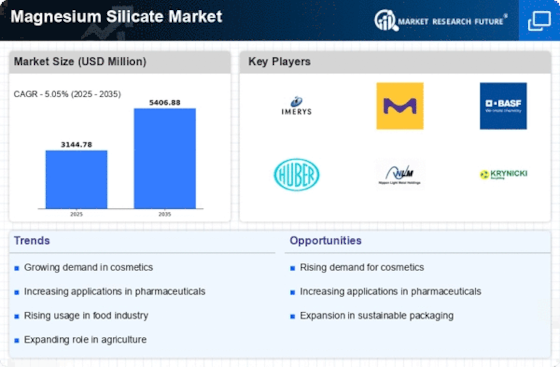Top Industry Leaders in the Magnesium Silicate Market

Market Summary and Growth
The magnesium silicate market, also known as the talc market, is experiencing steady growth driven by its diverse applications across various industries. This naturally occurring mineral boasts unique properties like softness, heat resistance, and electrical insulation, making it a valuable component in cosmetics, pharmaceuticals, food, and plastics.
Competitive Strategies
Within this growing market, players are adopting various strategies to gain a competitive edge. Here's a breakdown of some key tactics:
-
Product Innovation: Leading companies are actively developing new grades and modifications of magnesium silicate to cater to specific industry needs. This can involve particle size adjustments, surface treatment enhancements, or exploring alternative processing techniques. -
Geographic Expansion: Established players are expanding their reach into new markets, particularly in developing regions like Southeast Asia and India, where the demand for magnesium silicate is expected to surge. -
Focus on Sustainability: Sustainability is becoming a crucial factor for market share. Companies are implementing eco-friendly mining practices, minimizing environmental impact, and exploring alternative sources of magnesium silicate, such as recycled materials. -
Mergers and Acquisitions: Consolidation is another strategy being witnessed in the market. Mergers and acquisitions allow companies to leverage combined resources, broaden product portfolios, and gain access to new customer bases. -
Cost Optimization: Streamlining operations and optimizing production processes are essential for maintaining competitiveness. This could involve implementing automation, utilizing advanced extraction techniques, and negotiating favorable raw material pricing.
Factors Influencing Market Share
Several factors influence market share in the magnesium silicate market. Here are some of the most significant:
-
Production Capacity and Quality: Companies with high production capacity and a consistent focus on quality magnesium silicate will naturally hold a larger market share. -
Distribution Network: A robust and well-established distribution network ensures efficient delivery to various industry sectors, translating into a competitive advantage. -
Product Diversification: Companies offering a wider variety of magnesium silicate grades tailored to specific applications will be more attractive to a broader customer base. -
Brand Recognition: Established brands with a reputation for quality and reliability tend to command a higher market share. -
Customer Service: Responsive and efficient customer service fosters loyalty and repeat business, ultimately impacting market share.
Key Players
- Imerys
- Huber
- Mineral Technologies Inc.
- Specialty Minerals
- American Elements
- Fengchen
- Airotech Minerals
- Spectrum Chemicals
- Neelkanth Finechem
- Famous Minerals & Chemicals Pvt. Ltd.
- Maryland Lava Company
- Sorbent Technologies
- The Dallas Group
Recent Development
-
October 2023: Imerys, a leading manufacturer of mineral-based specialty solutions, announced the expansion of its talc production capacity in Vietnam to cater to the growing demand in Southeast Asia. -
November 2023: The European Chemicals Agency (ECHA) proposed restrictions on the use of talc containing asbestos fibers in cosmetics due to potential health concerns. This is expected to nudge the market towards asbestos-free and safe alternatives. -
December 2023: A research consortium in the United States successfully developed a bio-based talc substitute using a sustainable fermentation process. This innovation has the potential to disrupt the market in the long run, especially for applications requiring eco-friendly solutions.










